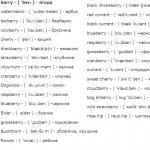Despite the fact that the Ukrainian language is sometimes very similar to Belarusian and Russian, if you come to the country without knowing the language, you can end up in an awkward situation full of misunderstandings. Therefore, it is worth preparing for your upcoming trip to Ukraine.
– an online resource aimed at replenishing the user’s vocabulary. To do this, you can use one of the blocks. Here you can look through the dictionary and listen to the pronunciation of each word, try to guess the word from the many suggested ones, collect phrases, and also use the services of a tutor via Skype.
Another free online service for learning the Ukrainian language. The site contains the most popular phrases and formulations. A translation with accompanying audio playback and illustrations will help you learn new material. The site has similar sections for other languages.
A resource that provides the opportunity to learn many languages, including Ukrainian. Pictures and sound recordings from native speakers can help you learn words. Using the site, the listener will learn to speak, read and write correctly in Ukrainian; more than a thousand expressions and words that are most often used in everyday life are collected here.
An online dictionary that will help the user learn new words. The visitor gets the opportunity not only to save words, but also to conduct self-tests. Registration is required.
An online library where you can find many Ukrainian audiobooks. Each page with an audio file has a link to the source text, so other skills are also involved with language comprehension.
This multilingual site will improve your pronunciation and sentence building skills in Ukrainian. The resource contains many audio recordings of native speakers.
– an online space for sharing knowledge in group chats. For an additional fee, you will find the most suitable pen pal for you. The system will select him based on the data you filled out in the proposed questionnaire: his native language, country of origin, age and language he practices. Here you can learn 115 languages in real time and for free, using voice or text chat. Here you can also compete in vocabulary games, read books in the online library, or correspond via email.
– Ukrainian for beginners. The channel contains cartoons that introduce the Ukrainian alphabet and tell simple stories that help you get used to the language.
Ukrainian language is part of the East Slavic group of languages. It is spoken in Russia, Belarus, Kazakhstan and other countries. It will be easier for a Russian person to learn Ukrainian, since both languages have words that are identical in meaning and sound. However, due to their certain similarities, there are difficulties here. You need to use every day to learn something new and remember it. Then the training will soon give positive results.
Is it difficult to learn Ukrainian from scratch?
Ukrainian words seem incomprehensible to some people, so it is difficult for them to reproduce someone else's speech. In this case, do not be discouraged. You need to get acquainted with all the features of another language.
1. In Ukrainian, everything happens according to the principle “as it is heard, so it is written.” In this way, you can quickly master written language.
2. There are two letters “g” in this language, one of which has a special pronunciation. It is characterized by an abundance of synonyms for the word.
3. Russian sentences differ in their construction from Ukrainian ones. Because of such nuances, the literal translation here is not always correct. You can learn the Ukrainian language on your own if you read the literature of this people - books by Mark Vovchk, Panas Mirny, Taras Shevchenko and other writers.
Competent speech is valued more than written speech, since not all people are able to quickly overcome the language barrier and speak Ukrainian. In this case, perseverance and patience are required from a person.
How to learn Ukrainian at home - tips.
Before learning Ukrainian, decide whether you should do it yourself or first take 2-3 lessons from an experienced teacher. Next, create a lesson plan and follow these steps:
1. Replenish your vocabulary by learning 2-3 dozen new words every day. To prevent this from turning into cramming, memorize them in sentences or combinations.
2. Read local press or online publications in Ukrainian. This will give you the opportunity to get used to the new language and involuntarily remember a large number of words.
We will start this lesson by studying the Ukrainian alphabet and Ukrainian letters. It should be noted that the Ukrainian alphabet is slightly different from the Russian one. Some letters are different from Russian in pronunciation, while others are different in spelling.
There are new letters in the Ukrainian alphabet:
Ї, ї – read as a sound (йи) or (ji), formed by the fusion of two sounds (й) and (и),
Є є – read as a sound (е) or (je), like the Russian letter e,
Ґ ґ – reads like the Russian letter g.
At the same time, the Ukrainian letter is pronounced differently than the outwardly similar Russian letter i.
And, and in Ukrainian it is read approximately like Russian ы.
І, і – should be pronounced like Russian i.
Pronounce the Ukrainian letter E, e, similar in sound to the Russian e.
Ukrainian G, g is pronounced softly, like g in the words aga (aha) and oh,
Ukrainian ch sounds harder than Russian.
In the Ukrainian language there is an apostrophe - a dividing solid sign, denoted in writing in the form of a superscript comma ", which is almost never found in the Russian language.
Now let's repeat all this in the table: Ukrainian alphabet
G, g
Ґ, ґ
Her
Є, є
And, and
І, і
Ї, ї sound Russian correspondence
(h) – soft g
(G)
(uh)
(je) like Russian e
close to(s)
(And)
(ji)
Otherwise, the pronunciation of Russian and Ukrainian letters is almost the same. But it should be remembered that all letters in the Ukrainian language are always read as they are written. The unstressed vowel o is pronounced clearly, that is, o should always sound like o, but not like a. The same applies to the letter g. It is always, unlike the Russian language, even at the end of adjectives in the genitive case, read as g (h).
Now let's practice. Pronounce the Ukrainian letter g. We pronounce it the way g sounds in southern Russian dialects softly, slightly towards the sound x, or how g sounds in the words aga (aha), oh (oho). Say these two words, repeat them. Did you feel the sound of the Ukrainian city? Wonderful. Now try to pronounce any words with the letter g, but pronounce this letter in Ukrainian. Love this soft sound filled with the beauty of the Ukrainian land. Let it be your sound. Love it as something closest to you. Practice pronouncing it throughout the day among your family. Let them love him too.
Have you already started exercising? Great! And if you pronounce all the letters clearly in accordance with their spelling, that is, always pronounce o as o, g even at the end of adjectives as g (thy (voho), distant (dalekoho), Ukrainian (ukrainskoho), rosiyskogo (rosiyskoho) and softly, then you already speak with a Ukrainian accent. Try pronouncing whole sentences this way.
Wonderful! Your pronunciation is close to ideal. Soften your e a little. Do you remember how it is written in Ukrainian? Of course e. Now try to pronounce the Ukrainian letter i (corresponds approximately to the Russian ы) more softly and with a higher timbre, that is, it should sound, unlike the Russian ы, a little closer to the Russian letter i (Ukrainian i). Can you imagine what Ukrainian and sounds like (corresponding to Russian ы)? Then let's make this beautiful sound together. That's right! A little softer and higher in timbre than Russian ы. Yes, yes, a little closer to Russian and... Well done! But if you can’t do anything with Ukrainian and just pronounce it like Russian ы, you won’t be mistaken by much. Now read the Ukrainian words: Grits (khryts), hryvnia (hryvnya), gory (hory), hands (hands), poky (poky).
Now try to fall in love with the most beautiful Ukrainian sound, which is denoted by the letter ї. It's easy to pronounce. Combine two sounds: sound (th) and sound (i). It will turn out (yi) or (ji). Is it really easy? Repeat several times. Let's pronounce this sound in words:
Ukraine (Ukraine), Kiev (Kyyiv), її (yiii), їzhak (yizhak), їsti (yists).
How is your Ukrainian and? Soft? And g? Have you forgotten that we pronounce g as in the word aha? Great! You learned the letter ї without difficulty. In the word Kiev at the end, pronounce not f, as in the Russian version, but v, as it is written. Pronounce this v at the end of a word a little closer to the y sound, something between v and u. It always sounds like this at the end of a word:
Pishov (pishoў), znayshov (znayshоў), robiv (robyў), bachiv (bachyў).
Constantly practice pronouncing all the above and any other words, maybe even Russian, but pronounce them in Ukrainian.
As a homework assignment, we suggest you read and memorize a poem by the famous Ukrainian poet Alexander Oles about the long-suffering Ukrainian language, which, no matter what, will already sound loudly, in addition, we would like to introduce you to the poem of our great Kobzar Taras Grigorievich Shevchenko “ Commandment." You have already mastered the Ukrainian alphabet! Good luck!
How long have we been waiting for the word of our will,
I axis is back, brining.
Brink - our language sings,
I enchant, quiet and drunk.
We've been waiting for you for so long... Call out to the people,
What kind of language did he save for us?
I fell into such terrible trouble,
If you can't stand for a moment.
(O. Oles)
COMMANDMENT
If I die, then give me a shout
To my grave
Middle steppe wide
In Ukraine dear,
Shcheb doe wide-field,
I Dnipro, I steep
It was visible, it was barely visible,
Yak is a roaring yak.
How I carried it from Ukraine
By the blue sea
I'm stealing blood... I'll go away
I doe, I burn –
I’ll leave everything, I’ll leave Pauline
Until God himself
Pray... until then
I don't know God.
Say hello and get up
Tear up Kaydani
I the enemy's evil blood
Sprinkle the will.
I am the greatest in this world,
In this world free, new,
Don't forget to remember
Unbreakable with a quiet word.
Or some other), you need to have a sufficient vocabulary. Therefore, your first step should be to study individual words and expressions. For this purpose, both electronic dictionaries, which are available on the Internet, and ordinary ones (you can buy them in a bookstore or borrow them from the library) are suitable. By the way, it is not at all necessary to purchase a large publication; you don’t need it yet. A pocket dictionary, which will contain the most necessary materials, is a good place to start.
At the same time, train your pronunciation, remember exactly how each word is read. This will help you, indicated in the dictionary next to the word, or a special audio application (it can be sold separately or immediately bundled with the book). To better remember what you read, say it all out loud.
Separate audio courses aimed at simultaneously replenishing vocabulary and regional knowledge can also help in practicing pronunciation. The content of such materials is, as a rule, dialogues in the language (often followed by Russian), monologues on a specific topic. You should consolidate what you have learned and at the same time get used to the sound of native speakers by watching films or listening to Ukrainian radio stations.
Remember that it is impossible to learn to speak a foreign language without knowing at least the basic rules of grammar. You must know how to construct sentences, know the word order in both declarative and interrogative sentences, and do not forget the ways of inflecting nouns and verbs. Otherwise, without this, you will not connect even two words with each other.
note
Real-time communication with a native speaker or with someone who, like you, is learning Ukrainian, can help improve your language skills. Finding a like-minded person is now easy thanks to numerous forums on the Internet.
Helpful advice
Practice little by little, but every day (without constant practice, you will not be able to really speak Ukrainian).
Sources:
- we speak Ukrainian
Many versions of Windows operating systems support a multilingual interface that allows you to enter information from the keyboard in various languages, including Ukrainian.
You will need
- - keyboard with Ukrainian layout.
Instructions
If you have a multilingual version of the operating system installed, open the control panel of your computer and go to the “Regional and Language” setting, then go to the “Languages” tab. Click on the “Options” button and use the menu on the right to add the Ukrainian layout for your keyboard. Then apply and save the changes.
You can also set up a special command for switching, which would be different from the normal layout change mode. In the same menu, you can delete those language layouts that you do not use when using your computer - just select them in the list and click on the “Delete” button on the right side of the window.
If your keyboard does not have Ukrainian characters, change it, learn the Ukrainian layout using special programs, or purchase special replacement stickers for keys with Ukrainian characters. They can be purchased from online stores and computer equipment sales points, or you can make them yourself.
When using a layout it is also quite easy to do without all this if you have
Ukrainian language is one of the most melodic languages in the world. People who believe that the Ukrainian language is a dialect of Polish or Russian are absolutely wrong. It is worth noting that initially Kievan Rus was located precisely on the territory of Ukraine and therefore the modern Ukrainian language is close to ancient Russian, and even in the last century the famous Ukrainian poet and writer Ivan Franko called it Russian. For example, the word brick in Ukrainian sounds like “tseglina”. Literally the word means "this is clay." At the same time, you need to know that in the Polish language there are as many “Ukrainian” words as there are “Russian” ones. Therefore, the Ukrainian language is not only an independent and unique Slavic language, but can also be quite difficult to learn. However, there is no need to be upset in advance.
When wondering how to quickly learn Ukrainian, you need to pay attention to two very significant details. Related and similar in sound to the Russian language, the Slavic language can turn out to be difficult precisely because of its similarity. Therefore, to quickly learn the Ukrainian language, it is very important to completely immerse yourself in the language environment and in no case try to translate every word in your head. The Ukrainian alphabet is very similar to the Russian one, but there are significant differences. Having learned the letters, you should completely disconnect from Russian grammar and try to perceive words by ear as accurately as possible. One of the advantages of the Ukrainian language is the fact that “it is written as it is heard.” This is a fairly important point, and if you “catch” it right away, then mastering competent written speech will not be difficult.
You need to pay attention to the fact that the Ukrainian language has two letters “g”; you will have to work on the pronunciation of one of them. Like the Russian language, the Ukrainian language has parts of speech, parts of words, noun cases, verb conjugations and much more. Because of this, the study of the native language by its native speakers lasts for 10-11 years of schooling. A person who has strong linguistic abilities will be able to master the Ukrainian language extremely quickly. There are known cases when Russian children who did not tell their teachers that they had never studied Ukrainian received an “excellent” grade. The Ukrainian language is characterized by the presence of many synonyms for the same word. Therefore, the same sentence in one case may sound very clear to a Russian-speaking person, but in another it may be completely incomprehensible.
Reading the works of the best representatives of Ukrainian literature will maximally replenish the vocabulary of anyone who has begun to study the Ukrainian language. These include works by Marko Vovchka, Mykhailo Kotsiubynsky, Panas Mirny, Ivan Nechuy-Levytsky, Lesya Ukrainka and Taras Shevchenko. Due to the fact that the Russian and Ukrainian languages have 62% of common vocabulary, you will not have to resort to the dictionary very often. And your vocabulary will expand significantly. When trying to learn the Ukrainian language using modern methods, you should under no circumstances resort to reading subtitles, which are abundant on Ukrainian TV today. Captions are sometimes extremely incorrect and cannot serve as a guide to literate speech.
It is also important to pay attention to the logic of the language. In Ukrainian, participles are used very limitedly, and the construction of sentences is sometimes significantly different from similar sentences in Russian. Therefore, a literal translation is not always correct and is not always correct. People who have tried to translate Ukrainian texts using electronic translators have probably more than once encountered the fact that at some point the sentence seems illiterate. This happens due to flaws in automatic programs. The gender of a word in Russian sometimes does not correspond to the gender of a similar word in Ukrainian. For example, in Russian: person, child - he, in Ukrainian: lyudina, ditina - she.
Without a doubt, any resident of Ukraine will easily understand the Russian language and will be happy to help someone in learning the Ukrainian language. It is more problematic if, for example, a Canadian citizen is a native speaker of Ukrainian. He may speak Ukrainian, English or French, but have absolutely no knowledge of Russian. It is when communicating with such a person that you can notice that he does not understand some Russian words, just as a Russian person does not understand some Ukrainian words. So how to learn Ukrainian? After complete immersion in the language environment, understanding 90, or even 100 percent of what is said will not be difficult. It is much more difficult to speak an unfamiliar language and speak competently.
It is literate speech that is an indicator that a person has mastered the language. If written literacy can be quickly developed through dictations, then overcoming the language barrier and speaking pure Ukrainian is much more difficult. Persistence and perseverance are required, although the most important factors are curiosity, self-confidence and love for the subject being studied. For those who have wondered how to learn the Ukrainian language, there is a small recommendation. You should start learning the language by watching children's programs.




